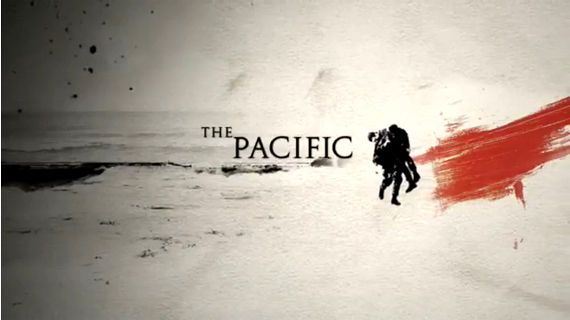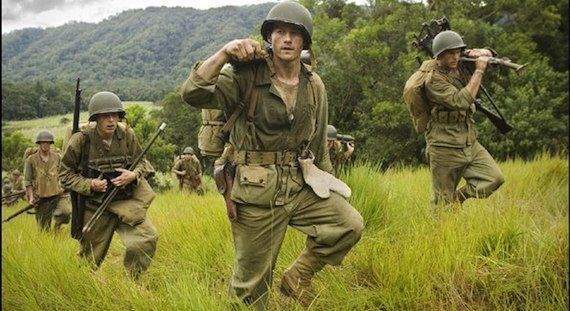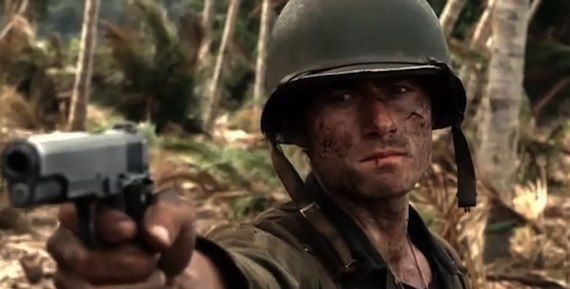If Tom Hanks and Steven Spielberg's landmark HBO miniseries Band of Brothers taught us one thing about war, it is that it is brutal, tragic, and psychologically scarring to soldiers on both sides of the conflict. What Band of Brothers also taught us however, is that men who train together, fight together and die together will, out of necessity, form an unbreakable bond of friendship and brotherhood, and it is this bond that gives them the capacity to perform incredible feats of bravery. With that in mind, let it be known now that The Pacific is NOT Band of Brothers, and in my opinion, nor should it be. From the earliest moments of Part One of The Pacific, Hanks and Spielberg's new HBO miniseries about World War II, you get a sense that, this time around, the terror of war will not be redeemed by moments of pure heroism and valor. That's not to say that we will not see heroic acts of course, merely that the reality of fighting in the Pacific theater was different than fighting in Europe. While the war in Europe was brutal, at least it was fought on familiar ground. Aside from the introduction of new weaponry and tactics, such as advanced tanks or the implementation of airborne troops, much of World War II in Europe was similar to World War I. Soldiers moved from Point A to Point B, dug in trenches, fought the enemy, and then moved from Point B to Point C. It is a narrative that we are familiar with, and one that is easy for the viewer to follow because it meshes with our expectation of war.
The reality of war in The Pacific however, is that there were no expectations. For United States Marines Robert Leckie (played by James Badge Dale), John Basilone (played by Jon Seda), and Eugene Sledge (played by Joe Mazzello), the names Guadalcanal, Iwo Jima, and Peleliu mean nothing; they are simply distant specks in the ocean. It is only when they arrive that the men discover they are not simply fighting the Japanese, but also disease, exhaustion, and the dense jungle itself, in which suicide attacks and guerrilla warfare are the norm. Speaking of Leckie, Basilone, and Sledge, it is important to note that these are the three main characters which we will be following over the course of the miniseries. In Part One, we meet each of them briefly (Sledge as he is told by his father that he cannot go to war because of a heart murmur, Basilone as he shares a farewell dinner with his large Italian family, and Leckie as he hits the shores of Guadalcanal) and we get a sense that, although they will not become friends, they will cross paths during the war, and in these intersections we will see how each of them carries the weight of the war on their shoulders. Apart from establishing strong performances and important themes, Part One of The Pacific is an incredible technical achievement. Foregoing the muted tones and grainy quality of Band of Brothers, The Pacific uses lots of light and bright colors to depict Guadalcanal as the island paradise that it could be if it weren't for the enemy lurking in the trees. The brightness of the daytime scenes contrasts magnificently with the night scenes, particularly the one and only battle of the episode; a standoff between American Marines and Japanese soldiers on opposite sides of a river.
The battle, which is the technical highlight of the episode, leaves nothing to the imagination, showing in frightening detail the white light of bullets whipping through trees and the sudden explosion of mortar shells. A painful scene the morning after the battle is the episode's dramatic highlight, again using bright colors to give a focal point to the corpses of dozens of soldiers left floating in the river, as well as a last-ditch suicide attack by a wounded Japanese soldier and a tense showdown between an unarmed Japanese soldier and the American Marines who use the opportunity to take potshots at him. In killing the soldier, Leckie demonstrates in one stroke his humanity, as well as his increasing acceptance of the grim reality of war. Ultimately, I think Part One, while somewhat uneven, is an unexpected and surprisingly effective introduction to a series that has the potential to become one of the most morally complex examinations of war in film or television history. As I said at the top of the review, The Pacific is not Band of Brothers. In this case, I think that's a good thing and I'm eager to see how the rest of the series develops. Discussion Did you get a chance to watch last night's premiere of The Pacific? (If you didn't, you can watch the full episode at HBO's website.) What did you think? How do you feel about the series in comparison to Band of Brothers?



